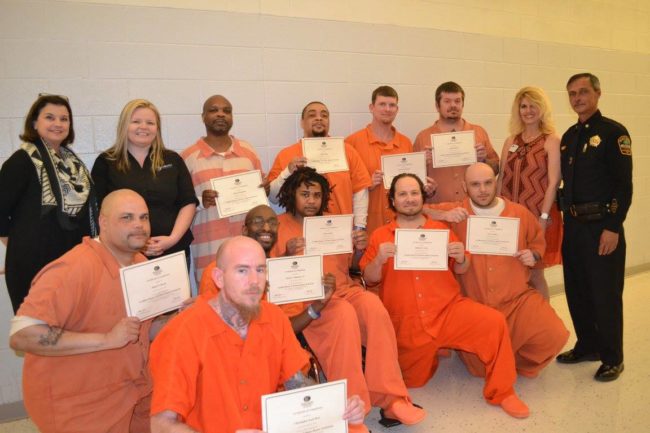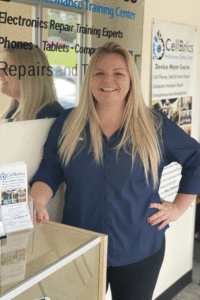
Spartanburg County Detention Center cell phone repair class graduation.
Cell phone repair has become a popular service, as well as a viable work option for those leaving jail and prison.
Just ask Nicole Russell, president of CellBotics in Atlanta. She played a pivotal role in helping a group of men in the Spartanburg (S.C.) County Detention Center and women in the Metro Transitional Center in Atlanta develop the skills to launch a cell phone repair business.
Russell has a history as an entrepreneur running cell phone and tablet retail sales and repair businesses. Inspired by her daughter’s father, who was in and out of prison, she wanted to do something to help people find jobs after being incarcerated
She worked with Nannette Bongiovi, who was the director of corporate training and career development for Spartanburg Community College at the time.
“I put together continuing education programs, and one of the Spartanburg city council members was tired of seeing the same mug shots over and over again in the local paper. The same people were being arrested over and over again,” Bongiovi says.
Reducing recidivism through education
The city council member contacted the president of the local community college and asked if there was a way to keep recidivism down. That led to a meeting at the jail between Bongiovi and people from the South Carolina Vocational Rehabilitation Dept. and SC Works. As a result of that meeting, they put together several certificate training programs under the banner of Operation Educate.
Bongiovi decided to work with Russell, because she not only teaches cell phone repair but helps students develop the skills they need to start their own business. Russell put together a week-long, eight-hour-per-day cell phone repair training program at the Spartanburg County Detention Center. Every participant was given a toolkit to use during the course and take with them after the course was completed, so they could do repairs on their own.
The tools were monitored very carefully. “There are safety rules when you’re dealing with cell phone repair equipment. We numbered each tool and tied it to each inmate at each desk,” says Russell.
“They would come in, and we would check in their tool boxes every day. We removed any batteries from phones that were operating. It was very secure. We never had things go missing in the room.”
Cell phone repair the most popular class
“Cell phone repair was the most popular of all the training classes we did. It was a phenomenal program and helped get a lot of people back on their feet after release,” says Bongiovi.
Anyone was eligible to participate, as long as they hadn’t committed violent crimes or were sexual offenders. The training program, which lasted a week, was preceded by job search training. Funding came from SC Works and the South Carolina Vocational Rehabilitation Dept. Those who didn’t qualify for funding from the agencies were paid for by contributions from the jail mess (vending) kitty.
Robert Varnum of Anderson, S.C., was a participant in the program.
“They had that course there and I begged them to let me take it, because they had 40 people ahead of me,” he says. He got in.
What people learned
What did he learn? “They pretty much taught everything about cell phone repair that you can imagine,” he says. They also taught him entrepreneurial skills and how to run a cell phone repair business.
Varnum was reincarcerated again for four years for a parole violation, and when he got out, Russell let him take the course once more for free, since so many things had changed during the time he was away.
“The phones had changed so much that I couldn’t take them apart and fix them anymore. Taking that course again really changed the course of my life,” he says. “I don’t have to ask people for anything, I don’t have to do anything questionable. When people start talking about committing crimes, I just walk away.”

Nicole Russell
He now has a mobile cell phone repair business and a workshop in his home. Covid has cut into his repair business, but during the past months, Varnum’s been buying used phones, and repairing and selling them to wholesalers. It’s a good business, he says.
Training women in cell phone repair
Russell also did the training for a similar program at Metro Transitional Center, a women’s release center in Atlanta. In a partnership with the Urban League, she trained six women. Russell actually had plans to create a center to train more, but the woman she was working with left the Urban League. The idea is still alive, however.
“We want to open a place called Second Chance Repairs and hire formerly incarcerated people,” says Michelle Cox, CellBotic’s executive computer hardware repair instructor, who also worked on the women’s release center program.
“Once they go through the program, we would hire them and eventually they would take over the program. We would have a community meeting and let the community know we’re here, and then we would offer discount repairs. This does two things. It welcomes people back to the community and welcomes the community to the business.”
Why learn cell repair?
Lakisha Malcolm of Atlanta was part of the Metro Transitional Center’s program.
“Why did she decide to take the program? “While you’re incarcerated you have a few options. You can give up, you can fit in like everyone else and think it’s a playground, or you can find yourself and better your life,” she says.
“I felt that the program gave me options that other programs in work release didn’t offer. I chose to learn a trade that I could use and would help me long-term, and not have to wonder whether people will hire me or look at me funny.”
Although these training programs were in the past, Russell is looking to the future to give more incarcerated individuals a chance to learn cell phone repair.
“We’d like to expand in Atlanta and nationally. Whatever particular jail is interested,” she says. “There is a need for repair, and good technicians are needed. You can be whoever you are, with purple hair or tattoos or whatever. As long as you’re good, you can get work.”
If you’re interested in running this program at your facility, feel free to reach out to Nicole Russell at 888-820-6618 x700.
For more information on how to start a cell phone business, please check out one of our previous blog articles.


